In recent years, we’ve seen a number of British players swap the Premier League for elite football abroad – Gareth Bale, Harry Kane, and Fikayo Tomori are just three examples.
One more example who ditched England’s top tier for Serie A is Scott McTominay.
The Scotsman is now an integral part of the Napoli midfield unit.
McTominay, a product of the Manchester United academy, went on to make 255 first-team appearances for the club he joined at the age of five, earning the respect of the United faithful for his efforts during what was a challenging time for the Red Devils.
After a reported transfer fee of £25m, McTominay traded Old Trafford for Stadio Diego Armando Maradona and has settled in nicely, helping the club take the top spot in Serie A after 12 games.
The Scotland International has quickly asserted himself as a fan favourite with his courageous displays, attacking intensity, and all-around energy and intensity—he’s even been dubbed McTomadona by the Napoli fanbase.
This scout report will provide a tactical analysis of McTominay’s role in Antonio Conte’s Napoli side, with the analysis discussing his important midfield role in Conte’s tactics.
Scott McTominay Player Profile
Scott McTominay Radar Map
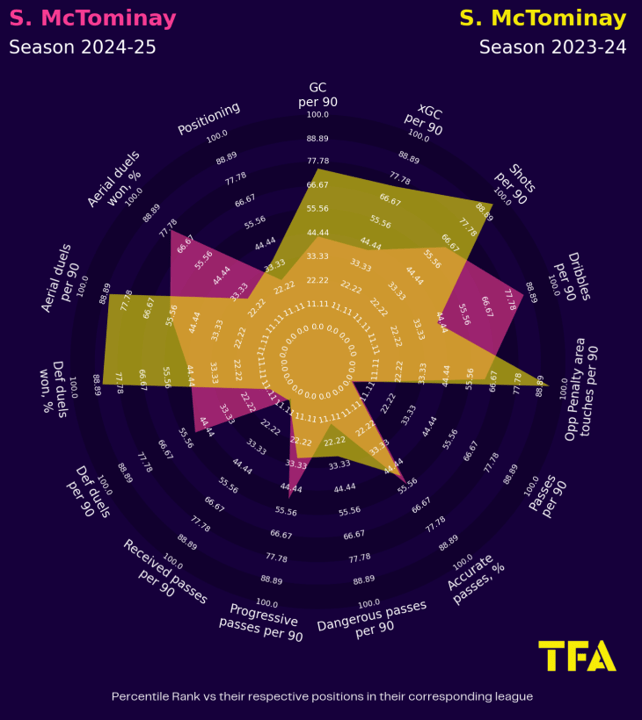
This first graph compares McTominay’s percentile output at Manchester United in the Premier League last season against his output in the Serie A for Napoli.
Although he is still in the early stages of his time at Napoli, McTominay’s role in Conte’s tactics is already showing visible signs.
Most notably, the Scotsman has more of a licence to progress possession via the ability to drive forward with the ball or play progressive passes.
Additionally, he is more engaged in defensive duels as far as the percentile comparison goes, giving us more insight into his role as number eight in Napoli’s tactics.
Scott McTominay Heatmap
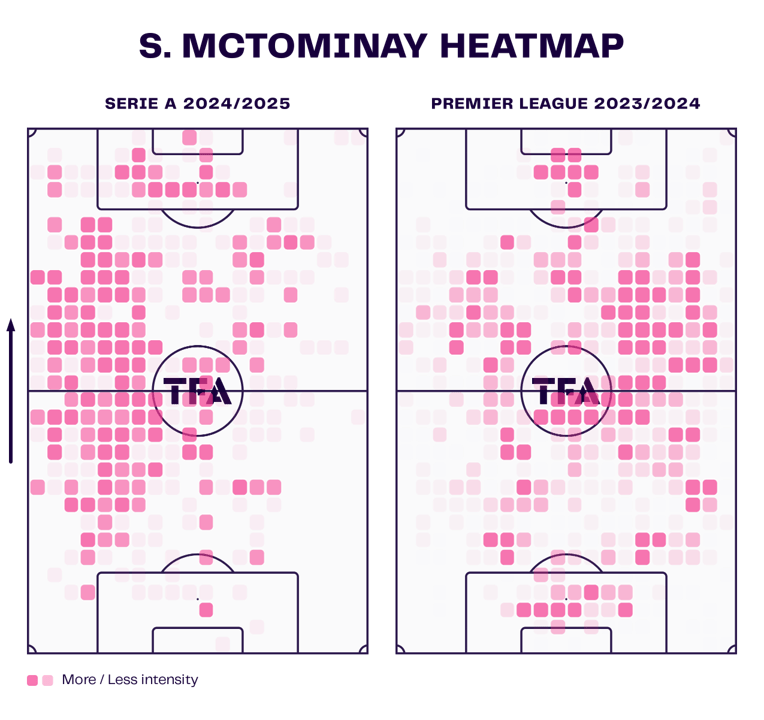
McTominay’s heatmaps serve as another tool to teach us about his role in midfield.
Often operating as an LCM in a 4-3-3 for Napoli, he is tasked with box-to-box duties, which is reflected in his heatmap—his heatmap of his time at United last season tells us that, in terms of his position at least, he had a more varied role in midfield.
Scott McTominay Defensive Role
During his time at Manchester United, McTominay was often tasked with playing as a defensive midfielder.
His off-the-ball aggression and general intensity can be ingredients that make him effective at disrupting opposition play in midfield areas, and he’s carried such traits over to Italy.
Scott McTominay Defensive Positioning & Territory
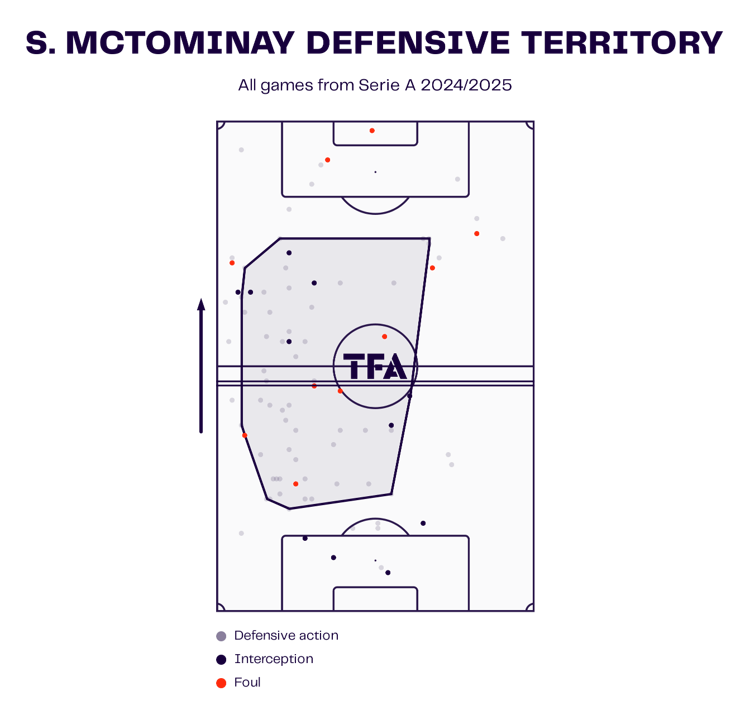
McTominay’s role as an eight/box-to-box player in Napoli’s tactical system requires defensive & positional discipline.
Still, Conte wants the Scotland international to use his aggression defensively in higher areas of the pitch, as reflected in the graph above.
As you can see, McTominay is no stranger to executing defensive actions and making interceptions in dangerous areas within the opposition half, something we’ve gotten used to seeing from him over the years.
Notice, though, where his defensive actions drastically drop off in the opposition half – leaving the midfield unit and engaging in a defensive fashion in the final third clearly isn’t something that is regularly required.
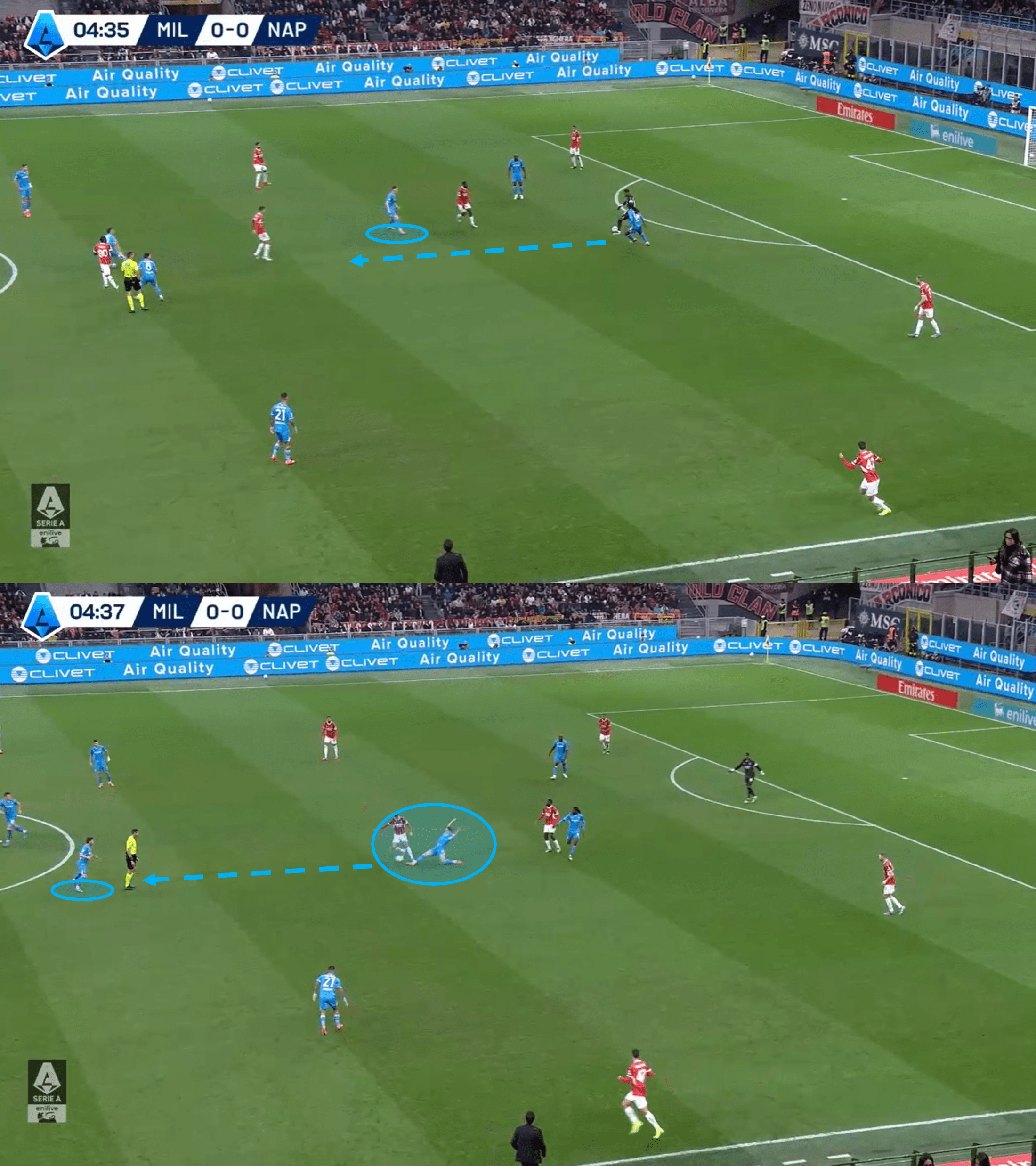
Figure 4 above shows us how McTominay and his midfield teammates work as a unit to trigger a press in certain moments.
Yes, the press in the example above was a result of a poor pass out from the goalkeeper, but the reaction of both McTominay and his midfield unit allowed for a seamless turnover and transition.
McTominay was already positioned higher up, not far behind the forward(s), anticipating a potential pressing opportunity.
That positioning gave McTominay the advantage when that hospital pass came in from the GK, and he was able to manoeuvre himself quickly into a position to put in a challenge and shift the ball onto a nearby teammate.
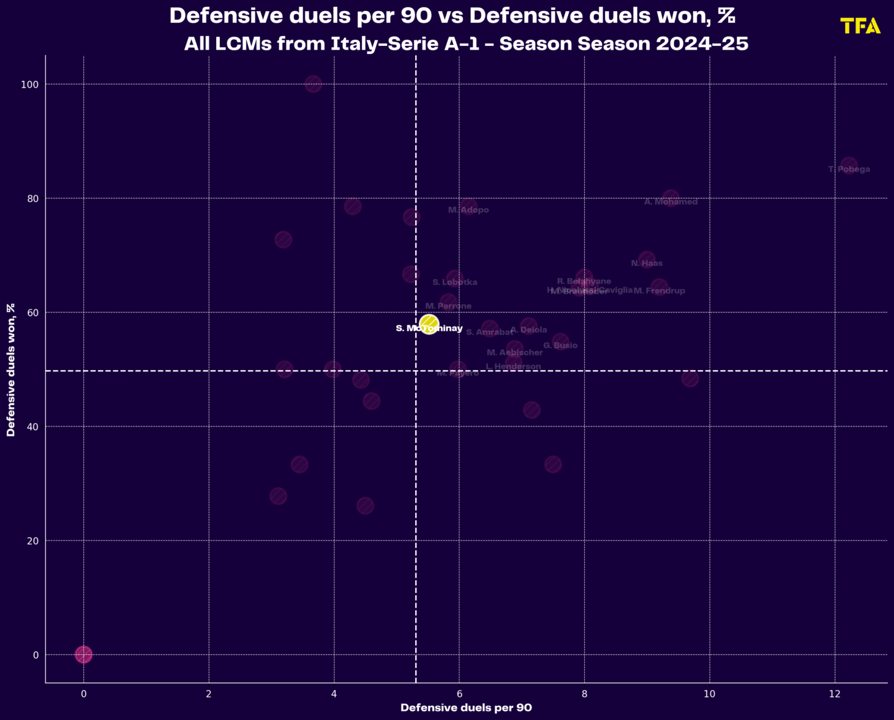
The graph above shows us how McTominay compares to other LCMs in Serie A this season when it comes to engagement and success levels for defensive duels.
As you can see, he scores above average for both attempts per 90 and success percentage—5.58 defensive duels per 90—which tells us how active he is in midfield when Napoli don’t have possession.
When we dig deeper into McTominay’s defensive data this season in Serie A, we learn that he does contribute to a decent level, but his numbers do not reflect a highly influential player from a defensive perspective—5.13 successful defensive actions per 90 gives us some insight into that notion.
Scott McTominay Attacking Role
McTominay’s role in Napoli’s tactics is (so far) more aggressive and intense in several areas, including some attacking metrics.
We’ve all seen the attacking influence he can have on a team – he bagged seven EPL goals last season and has also chipped in with nine goals for Scotland: for someone who isn’t a natural/regular number 10, he knows where the goal is.
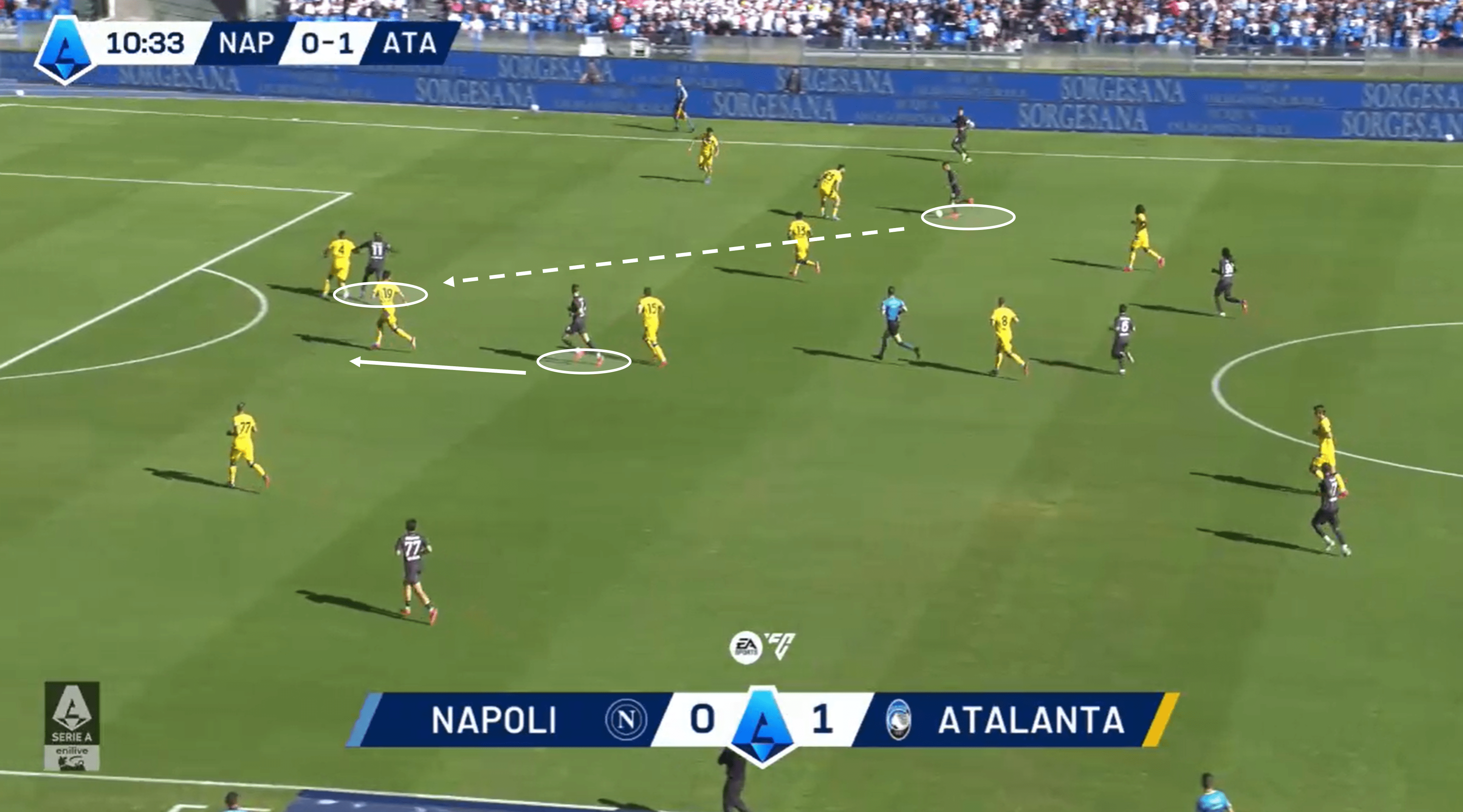
The data shows that McTominay is already on his way to becoming a consistent attacking threat for Napoli.
In Figure 6, we see an example of the attacking positions he can pop up in.
Pushing forward, out from the midfield three, he is able to offer central attacking support for Romelu Lukaku, which is exactly what he does in this case, almost scoring as a result.
He has two Serie A goals this season, which translates to 0.23 goals per 90, which is among the highest in terms of goal contributions from Serie A LCMs.
He is also among the highest when it comes to shots per 90 (1.82) – another indication of his constant attacking presence.
Further proof of his involvement in attack is his average of 2.05 touches in the box per 90 – while this number may seem low, remember that McTominay usually operates an eight, who has defensive duties as well as attacking responsibility.
Scoring goals isn’t the only attacking weapon brought to the table by McTominay – he has also proven his ability to carry the ball.
Scott McTominay Penetrating Carries
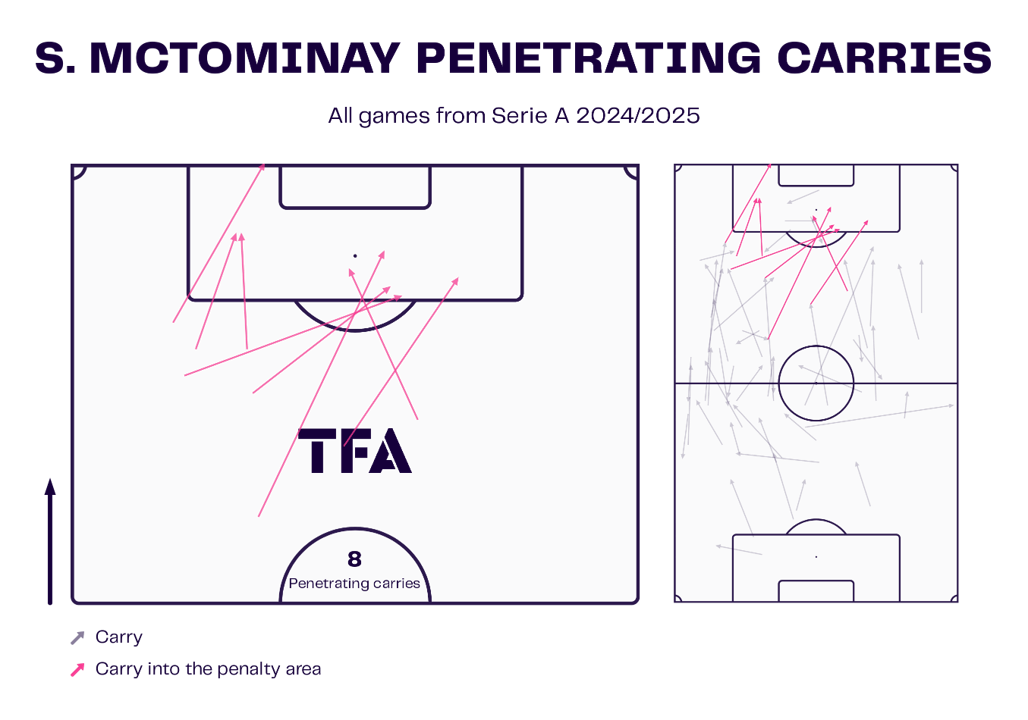
As you can see, McTominay offers the occasional penetrating carry and a good number of ball carries and progressive runs, offering 1.94 of the latter metric per match.
This action can provide an injection of pace and intensity to build-up and attacking phases, but it can also be very effective in transition moments, which we will provide analysis of shortly.
McTominay’s running with the ball has been one of his biggest assets so far this season—his average of 3.42 dribbles per 90 is the third-highest compared to other central midfielders in Serie A, and his success rate of 60% tells us that he is able to be successful on a good number of occasions.
In fact, his overall attacking presence is one of the most influential in Serie A compared to other CMs in that division – he offers 2.73 successful attacking actions per 90 (sixth-highest vs Serie A CMs).
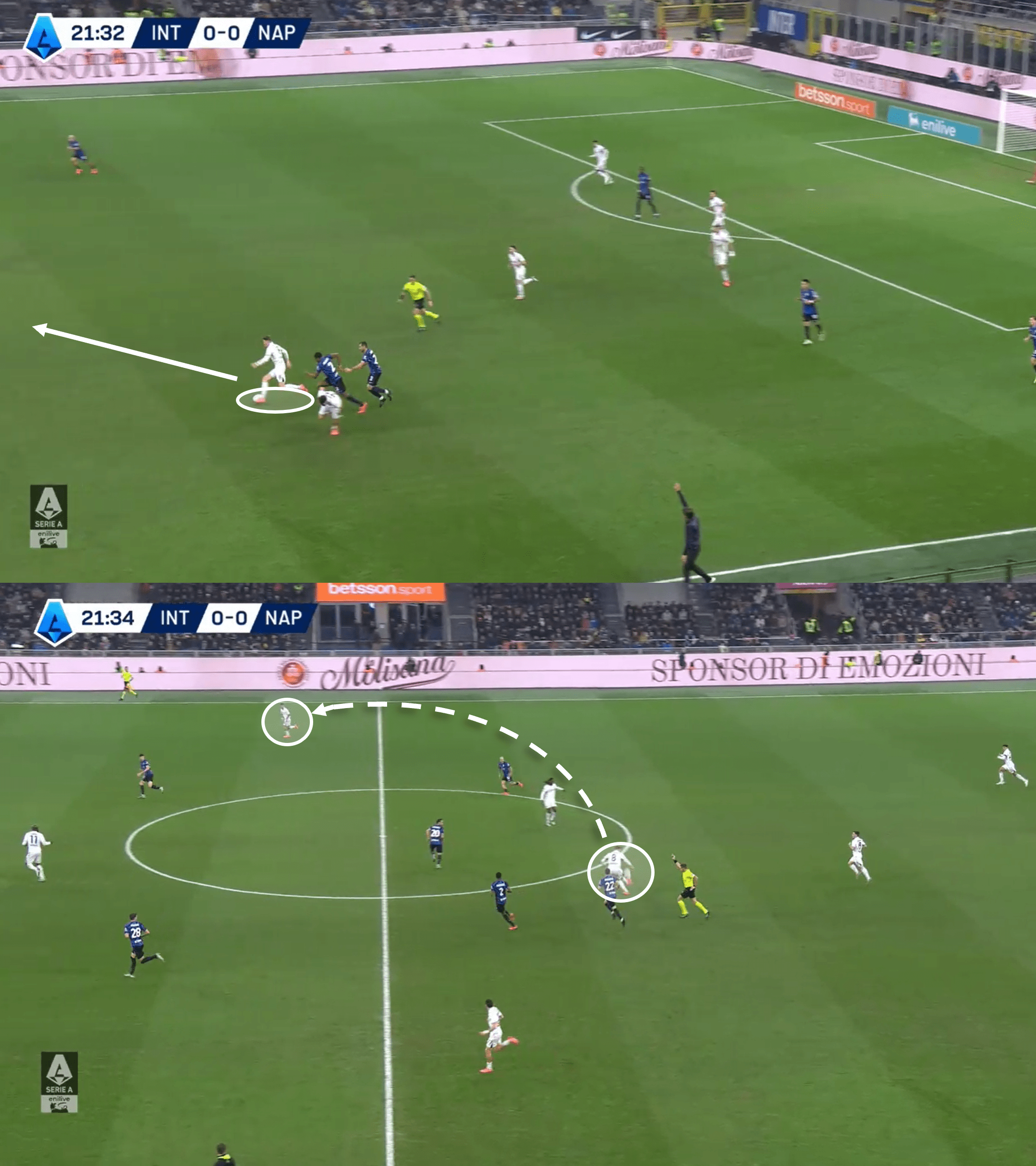
Before, we mentioned McTominay’s ability to be impactful in attacking transitions, and we see that in Figure 8.
Initially, the ex-Manchester United man is able to shake off not one but two Inter players as he takes the ball into the open space within central midfield, launching his team into a dangerous attacking transition.
After carrying the ball both away from danger and into an area of promise, he wastes no time in providing continuation for the attacking transition by executing a curling, lofted pass into the wide area, allowing his team the chance to push forward and attack.
While those actions were simple at their core, McTominay’s execution was excellent, and we can expect to see even more of it as the season goes on.
At the time of writing, McTominay averages 2.28 attempted progressive passes per 90, something that both he and Conte will want more of as he continues to settle in at Napoli – we’ve seen the ability to provide such passes, particularly in transitions, the challenge now is to make it a more regular feature of his game.
In this scout report, we’ve highlighted several attacking strengths that McTominay has displayed in a Napoli shirt.
However, he ranks low (compared to Serie A CMs) in areas such as passes to the final third, through passes, and shot assists.
While not all of those will be concerning for Conte and co, due to tactics, we’d expect to see McTominay offer more passes to the final third, given his attacking influence in other areas.
Conclusion
Scott McTominay’s experience playing in the Premier League—being used to the intensity and game tempo—means he is very well equipped to play in Serie A, and we are seeing that reflect in his performances.
The Scotsman has been an important figure in Conte’s tactics in the early stages of the 2024/25 season and can take some credit for his team’s current top-of-the-table position.
Of course, it will be interesting and important to revisit/reassess his impact later in the season.
Can he continue to be influential both in and out of possession like he has been so far?

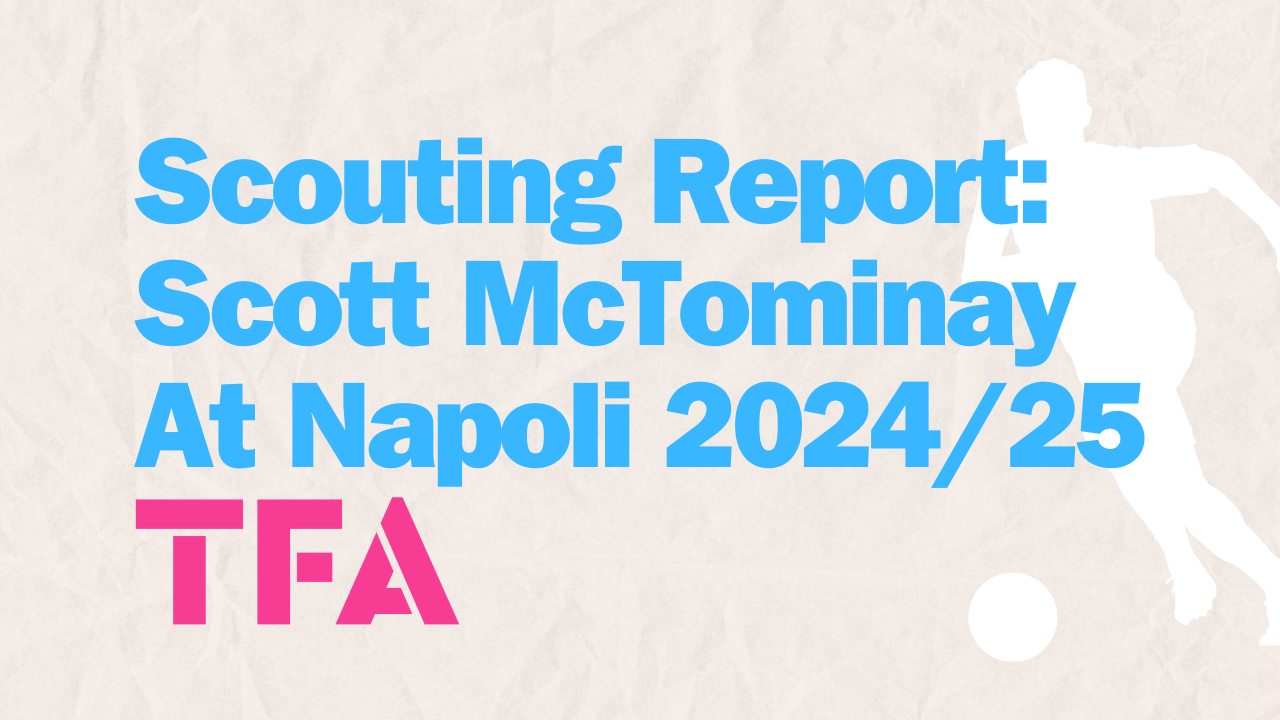




Comments